The Story Behind Rise Of The Planet Of The Apes
How the chimps topped the box office
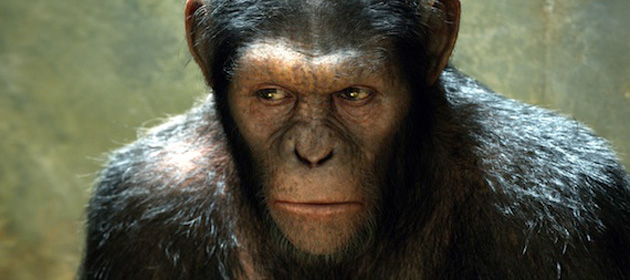
Evolution begins
Back in 2001 the Planet Of The Apes franchise looked dead in the water. Tim Burton’s reimagining of the original film had received a critical mauling and it was clear that if Fox wanted to persist with the franchise, they would need to take things in a radically different direction.
Burton’s film had ended with the door left ajar for a potential sequel, with Mark Wahlberg’s astronaut returning to Earth only to be confronted by a statue of General Thade in place of Abe Lincoln. Taking aside the fact that it didn’t make much sense, there was at least scope here for Wahlberg to go round 2 with those damned dirty apes.
However, Burton was none to keen to repeat the experience, telling The Guardian he’d, “rather jump out of a window” then direct a sequel. Meanwhile, Wahlberg was still smarting at having passed up on Ocean’s Eleven to star in the original and had no intention of tripping himself up for a second time.
But despite all this negativity Fox weren’t about to give up on one of their most reliable cash cows, deciding that all that was needed was a new approach. In a shockingly original move it was judged that a prequel would be the best way to proceed, with Minority Report scribe Scott Frank commissioned to pen a script... the apes were on the rise again!
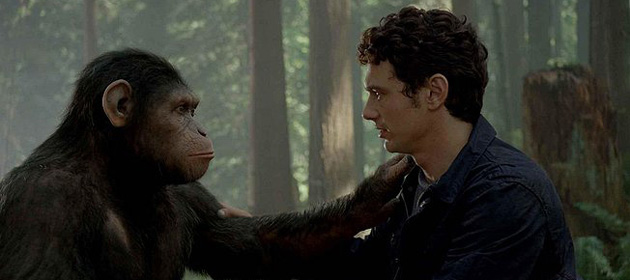
Teething problems
Using the working title Caesar , Frank was determined to pen a script that would steer clear of the hammier elements of the Apes series in order to create a more serious-minded sci-fi. However, just when it seemed that progress was being made, Frank left the project along with producer Scott Rudin over a dispute with the studio concerning the film’s direction.
Not to be discouraged, Fox pressed ahead with its grand plan and in May 2010, the studio announced that a new Planet Of The Apes prequel would arrive in just over a year’s time. That’s right, they even went as far as to name a release date, with 24 June 2011 marked as the day the apes would storm the multiplex.
The project was given the working title Rise Of The Apes , and a loose plot outline was released by Fox in an official statement. “ Rise Of The Apes is an origin story in the truest sense of the term,” began the blurb. “Set in present day San Francisco, the film is a reality-based cautionary tale, a science-fiction /science-fact blend, where man’s own experiments with genetic engineering lead to the development of intelligence in apes and the onset of a war for supremacy.”
It’s a synopsis that sums the film up fairly neatly, but how did Fox manage to whip up such a coherent plot from a script they had supposedly had problems with? Well, Jamie Moss, Rick Jaffa and Amanda Silver must share the credit around between them as all three screenwriters were brought in at various points to lick Scott Frank’s original script into shape.
The result was the fabled “hard sci-fi” that Fox has apparently been looking for. Now all they needed was a director who could bring it to life…
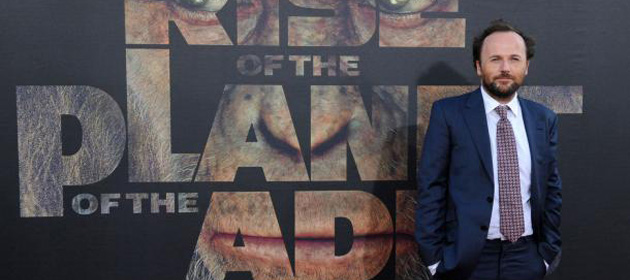
From left field
It was at this point that Fox sprung their first genuine surprise, with the appointment of little known British director Rupert Wyatt. Best known for his work on understated prison-break drama The Escapist , Wyatt had never presided over a film of this magnitude before but seemed to fit the more cerebral theme the studio was looking for.
However, if Wyatt had expected to be given the keys to the candy store, he was mistaken. “It wasn’t that different [ to working on a smaller film ],” said Wyatt in an interview with Film School Rejects . “There are certain responsibilities and requirements that you have to fulfill when you’re making a studio film and I still had a huge responsibility to my budget.”
On top of keeping the spending under control, Wyatt also had to adjust to becoming something of a hired gun. “I came onto this film quite late in the day,” he said, “with a script that was already pretty evolved. My background as a filmmaker was always to generate my own work and write my own scripts, so this has been very different for me. You have to learn that skill of taking something, but making it your own. I feel like this film has taught me that.”
Happily for Wyatt, one of his cast was already fighting his corner, with Brian Cox singing his praises to anyone who’d listen. “Rupert is somebody who I had worked with before,” he told Movieweb . “He is sort of a prodigy of mine, and probably one of the best young directors around. He made a film called The Escapist I was in, and I think he’s one of the most visually interesting directors around.”
However, it would take more than just visual flair to rekindle the ailing Planet Of The Apes franchise…
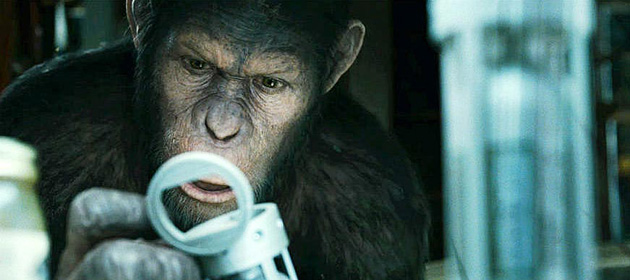
Out with the old
One of Wyatt’s key concerns was the need to break away from the traditions of the previous Apes films, with his story set to establish a whole new mythology from what had gone before.
“It was never my intention to be a slave to the franchise,” he said at this year’s Comic-Con. “The writers presented us with a script that is very respectful and very subtle in acknowledging the mythology, but it’s very much an origin story. It’s set in the modern day, and it doesn’t deal with humanoid apes. It deals with apes that are of our world.”
Yes, there were to be no monkey costumes this time around in one of the most radical departures from previous Apes outings. However, this was not change for the sake of it. Wyatt was convinced that a new approach was necessary to create a more credible sci-fi experience.
“We’ve taken a different approach to the origin of the mythology,” he told Film School Rejects . “[ Initially ] it was apes being brought into domestic households and being enslaved, but we’ve taken a more scientific approach with how the apes have evolved. I actually find that more plausible. To speculate on a period of time, we’d be talking about generations and generations of how a chimpanzee could actually evolve into a humanoid creature, which could cause a revolution. I think there needs to be some sort of scientific reasoning behind that, and that’s what we’ve gone for.”
So with blokes in ape-suits seemingly out of the question, how exactly would Wyatt be presenting his simian stars?
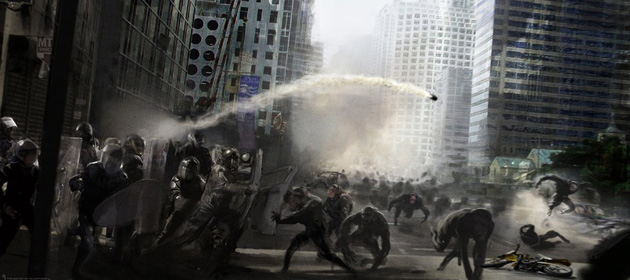
Weta the devil you know
As soon as the decision was made to depict the apes as realistically as possible, using performance-capture technology became the obvious next step.
“We had a choice,” Wyatt told Collider . “We could use live apes or we could use performance-capture technology. We immediately set about exploring both options, and we very quickly put to bed the idea of using live apes for all sorts of reasons. I personally think it would have been a bit of an irony to be telling the story of our most exploited and closest cousins, and use live apes to tell that story. I think it would have been a cruel twist!”
Neatly avoiding a run-in with the animal rights brigade, Fox enlisted Weta Digital in New Zealand to bring the apes to life. Having pioneered performance-capture in the Lord Of The Rings films, they were always going to be the studio’s first port of call, and Wyatt was duly impressed by their aptitude with the developing technology.
“This is light-years ahead of what they achieved with King Kong and The Lord Of The Rings ,” said Wyatt. “They’ve always said that 2005 is the Stone Age compared to where we are now! They digitally grow every strand of hair that you see and it’s amazing the amount of work that goes into it, especially bearing in mind there’s hundreds of apes in our film. That’s a big job.”
There may well be hundreds of apes on display, but Caesar the chimp was always going to be the focal point of the film. So who better to play him than King Kong himself?
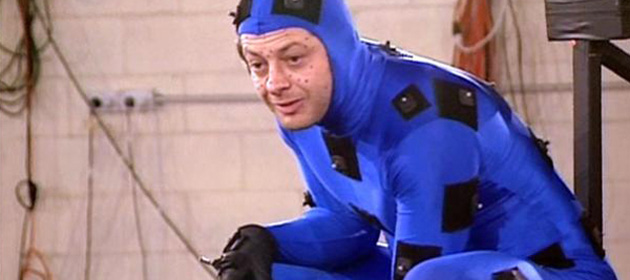
Serkis act
As soon as Weta were involved, it was only a matter of time before Andy Serkis was confirmed to play rebellious chimp Caesar. Playing the first ape to demonstrate sentience and the figurehead of the subsequent simian uprising, it was a role that would demand a lot from Serkis both physically and emotionally.
“I get to play Caesar from an infant through to a revolutionary leader, so that in itself is an incredible challenge,” Serkis told us earlier this year. “It’s a very personal story with global implications.”
On top of the personal challenge, the film also represented a new working environment for this most seasoned of performance-capture professionals. “Basically this film represents one of the first and biggest examples of having multiple [ performance capture ] actors on a live-action set,” he explained. “Having this amount of live performances is pretty new. The Golden Gate sequence must be a world record in terms of the size of the capture area.”
Not that Serkis was remotely fazed by engaging with the technology once more. “A motion-capture costume is actually a very liberating costume,” said the actor at a recent conference held to discuss the film. “The alternative is to wear a suit with fur and have layers of prosthetics on your face, like the actors did in the original Apes movies. For me, I find that much more restrictive… performance-capture allows you to just play intention without being encumbered in any way.”
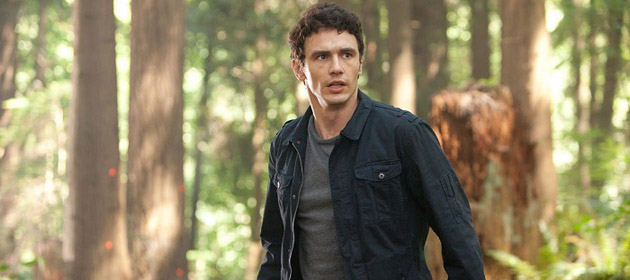
Star power
On the human side of proceedings James Franco was cast as Will Rodman, the scientist who raises Caesar from cheeky monkey to angry ape. At the time he bagged the role Franco was a solid Hollywood name, if not a fully-fledged A-lister. However, an Oscar nomination for his startling turn in 127 Hours would soon change all that, giving the film a welcome dose of star-wattage in the run up to its big release.
For Franco, the project was an opportunity to work with a performer he’d long admired from afar. “One of my reasons for doing this movie was to work with Andy [ Serkis ],” the star told Collider . “I've watched every single minute of the extra features on all of the Lord of the Rings and King Kong DVDs, so just from watching that I kind of had an understanding of how it worked. I thought it would be a new and interesting acting experience, working opposite someone playing a chimpanzee.”
So was it a tricky business to adjust to? Not as tricky as you might expect, according to Franco. “The imagination just kind of takes over, just like you meet someone and the next day they are playing your mother,” he explains. “You kind of roll with it if the scene is working. Andy was so good with the chimp behavior that it was actually pretty easy to fall into that kind of relationship.”
As for the film itself, Franco argues that the story owes as much to Mary Shelley as it does to the Planet Of The Apes canon. “One of the differences is that the others seem to be much more about commentaries on class relations, inter-species relations, race relations, all of these things,” he begins, “whereas ours is a prequel and much more of a Frankenstein story. A scientist starts messing with nature and it gets out of hand.”

Team Effort
Franco was soon joined by a stellar supporting cast including the aforementioned Brian Cox, Freida Pinto, John Lithgow and Tom Felton. And whilst much of the talk has revolved around the film’s stunning visuals, Lithgow for one was won over by the unusually powerful screenplay.
“I’ve never watched a Planet of the Apes film start to finish,” the star told the LA Times , “but this script genuinely moved me. It really surprised me. Science fiction works best when it’s fact-based, when it’s got some sort of emotional authenticity. What happens if a drug is created that can jump start a primate brain? It’s a fascinating premise, and it sets in motion this emotional story of our mutual relationship with this ape. You just don’t expect to be touched like this by an Apes movie.”
Whilst Lithgow was charmed by the premise, Tom Felton was thrilled by the chance to pick up some new skills. “I bored Andy for hours about how he got into [ performance-capture ] and how he came to be the godfather of it all,” Felton told us earlier this year. “He talked me through a lot of it, and it’s something I’d like to look into.
“There’s so many scripts that you could have read 20 years ago and you’d have said, ‘You can’t physically make that,’” continues Felton. “But now it’s an option! You can do things that weren’t really achievable.”
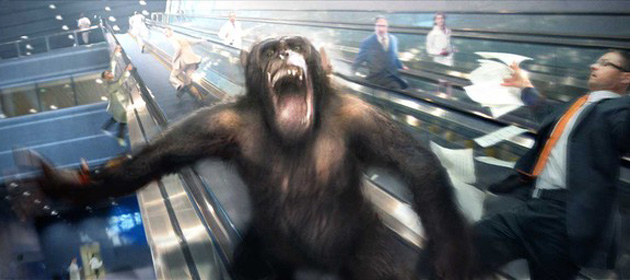
What's in a name?
Initially going by the title Rise Of The Apes , Fox announced in April that the upcoming film would be released under the banner of Rise Of The Planet Of The Apes . Whilst something of a mouthful, the new title was a deliberate attempt to link the new film with the franchise that first spawned it.
Whilst many initially dismissed the move as insulting to the intelligence of the average filmgoer (surely people would get the gist that this is a film about a war between apes and humans?), reports indicate that the decision was taken with the fans in mind.
Initial feedback surveys conducted by Fox suggested that many Planet Of The Apes devotees were disappointed to see the film breaking with the traditional title structure adopted by the previous entries in the series.
We’re still not convinced that the studio weren’t more concerned about hammering home their brand identity, but now that we’ve got used to it the title doesn’t seem quite so clunky as when it was first announced. Although perhaps that’s more down to the fact that the film itself is one of the finer entries to the franchise…
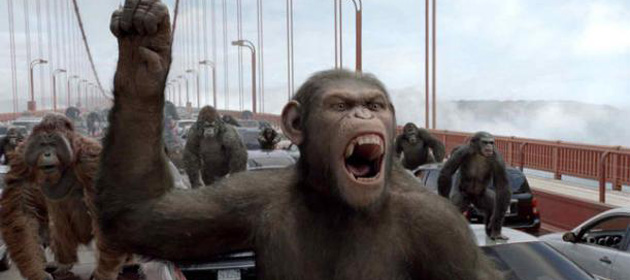
Anyone for seconds?
Having garnered a selection of approving reviews from the critics (you can check ours out here ), Rise Of The Planet Of The Apes finally repaid Fox’s faith in the franchise by storming to the top of the US box office on its opening weekend.
Unsurprisingly, there has already been talk of a sequel and Rupert Wyatt is already starting to formulate ideas as to where the series could go next. ““You could start this story again eight years from where we left off,” said Wyatt to Bleeding Cool . “[We could have] the next generation of apes, those that have come from our protagonists, perhaps going in to a conflict with humans and showing real fear in the same way as going into war [is] for young soldiers in this day and age.”
“Or how apes are taking over cities,” he continued, “and being moved into human environments and having to interact with them. Having to deal with things that are part of our culture and understand and evolve through them.”
Seeing as he did such a bang-up job first time around, we wouldn’t be remotely surprised to see Wyatt given a second bite of the cherry. Having spent the best part of a decade breathing new life into the series’ twitching corpse, it would be very surprising if Fox weren’t planning sequels, and Wyatt has surely done enough here to warrant the chance to continue his story.
Revenge For The Rise Of The Planet Of The Apes ? It could happen…
George was once GamesRadar's resident movie news person, based out of London. He understands that all men must die, but he'd rather not think about it. But now he's working at Stylist Magazine.
Weekly digests, tales from the communities you love, and more
You are now subscribed
Your newsletter sign-up was successful
Want to add more newsletters?

Every Friday
GamesRadar+
Your weekly update on everything you could ever want to know about the games you already love, games we know you're going to love in the near future, and tales from the communities that surround them.

Every Thursday
GTA 6 O'clock
Our special GTA 6 newsletter, with breaking news, insider info, and rumor analysis from the award-winning GTA 6 O'clock experts.

Every Friday
Knowledge
From the creators of Edge: A weekly videogame industry newsletter with analysis from expert writers, guidance from professionals, and insight into what's on the horizon.

Every Thursday
The Setup
Hardware nerds unite, sign up to our free tech newsletter for a weekly digest of the hottest new tech, the latest gadgets on the test bench, and much more.

Every Wednesday
Switch 2 Spotlight
Sign up to our new Switch 2 newsletter, where we bring you the latest talking points on Nintendo's new console each week, bring you up to date on the news, and recommend what games to play.

Every Saturday
The Watchlist
Subscribe for a weekly digest of the movie and TV news that matters, direct to your inbox. From first-look trailers, interviews, reviews and explainers, we've got you covered.

Once a month
SFX
Get sneak previews, exclusive competitions and details of special events each month!



